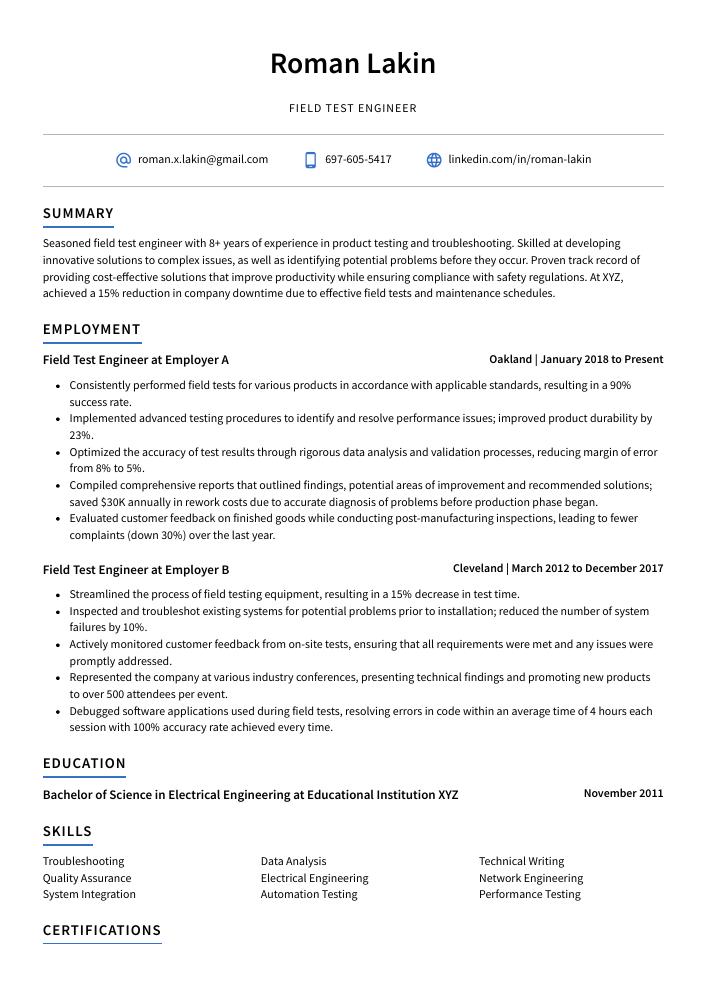Field Test Engineer Resume Guide
Field Test Engineers conduct tests on products in the field to ensure they are functioning properly and meet customer requirements. They use specialized equipment to diagnose, troubleshoot and repair hardware or software issues that arise during testing. Additionally, Field Test Engineers document test results for analysis by engineering teams.
Your knack for field testing and engineering is unparalleled, but potential employers don’t know your capabilities. To make them aware of what you can do, it’s essential to write a resume that highlights your achievements and experience.
This guide will walk you through the entire process of creating a top-notch resume. We first show you a complete example and then break down what each resume section should look like.
Table of Contents
The guide is divided into sections for your convenience. You can read it from beginning to end or use the table of contents below to jump to a specific part.
Field Test Engineer Resume Sample
Roman Lakin
Field Test Engineer
[email protected]
697-605-5417
linkedin.com/in/roman-lakin
Summary
Seasoned field test engineer with 8+ years of experience in product testing and troubleshooting. Skilled at developing innovative solutions to complex issues, as well as identifying potential problems before they occur. Proven track record of providing cost-effective solutions that improve productivity while ensuring compliance with safety regulations. At XYZ, achieved a 15% reduction in company downtime due to effective field tests and maintenance schedules.
Experience
Field Test Engineer, Employer A
Oakland, Jan 2018 – Present
- Consistently performed field tests for various products in accordance with applicable standards, resulting in a 90% success rate.
- Implemented advanced testing procedures to identify and resolve performance issues; improved product durability by 23%.
- Optimized the accuracy of test results through rigorous data analysis and validation processes, reducing margin of error from 8% to 5%.
- Compiled comprehensive reports that outlined findings, potential areas of improvement and recommended solutions; saved $30K annually in rework costs due to accurate diagnosis of problems before production phase began.
- Evaluated customer feedback on finished goods while conducting post-manufacturing inspections, leading to fewer complaints (down 30%) over the last year.
Field Test Engineer, Employer B
Cleveland, Mar 2012 – Dec 2017
- Streamlined the process of field testing equipment, resulting in a 15% decrease in test time.
- Inspected and troubleshot existing systems for potential problems prior to installation; reduced the number of system failures by 10%.
- Actively monitored customer feedback from on-site tests, ensuring that all requirements were met and any issues were promptly addressed.
- Represented the company at various industry conferences, presenting technical findings and promoting new products to over 500 attendees per event.
- Debugged software applications used during field tests, resolving errors in code within an average time of 4 hours each session with 100% accuracy rate achieved every time.
Skills
- Troubleshooting
- Data Analysis
- Technical Writing
- Quality Assurance
- Electrical Engineering
- Network Engineering
- System Integration
- Automation Testing
- Performance Testing
Education
Bachelor of Science in Electrical Engineering
Educational Institution XYZ
Nov 2011
Certifications
Certified Field Test Engineer
International Society of Certified Electronics Technicians
May 2017
1. Summary / Objective
A resume summary/objective is your chance to make a great first impression on the hiring manager. As a field test engineer, you can use this section of your resume to highlight relevant skills and experience that demonstrate why you are an ideal candidate for the job. For example, mention any certifications or qualifications related to testing equipment, describe how you have successfully conducted tests in various environments (e.g., extreme temperatures), and showcase any awards or recognition received from employers/clients.
Below are some resume summary examples:
Driven and experienced field test engineer with a proven track record of success in the development and deployment of high-performance systems. Skilled at designing, troubleshooting, debugging, and optimizing new products for marketability. Expertise in testing various hardware components under extreme conditions to ensure reliable performance in any environment. Consistently recognized as an effective communicator between engineering teams and customers.
Detail-oriented field test engineer with 5+ years of experience in the telecom industry. Skilled in designing, implementing and troubleshooting complex network systems to support customer services. At XYZ, led comprehensive field testing on a variety of new mobile products and resolved issues quickly during product development cycle. Received company recognition for reducing customer complaints by 20% due to successful debugging efforts.
Energetic and reliable field test engineer with 8+ years of experience leading successful product tests and evaluation projects. Proven track record in developing comprehensive testing protocols, producing detailed reports, and making recommendations on how to improve products. Seeking a Field Test Engineer role at ABC Company where I can leverage my knowledge and expertise to help develop innovative new technologies.
Hard-working field test engineer with a proven track record of delivering high-quality results in a timely manner. 5+ years experience solving complex problems and troubleshooting hardware, software, and network issues for clients throughout the world. Looking to join ABC Technologies to utilize knowledge of RF propagation testing procedures and debugging tools in order to ensure quality assurance standards are met.
Talented field test engineer with 5+ years of experience in the telecom industry. Possesses a strong background in wireless communication systems and protocols, including 3GPP and LTE standards. At XYZ, conducted over 300 field tests for voice/data services on multiple networks. Skilled at troubleshooting customer issues through meticulous analysis of network data logs to identify problems quickly and efficiently.
Diligent field test engineer with 5 years of experience in testing and evaluating new products across various industries. Proven track record of ensuring quality standards are met, staying up-to-date on the latest technologies, and delivering projects within tight deadlines. Seeking to join ABC Tech as a field test engineer to continue improving product reliability through advanced testing protocols.
Professional field test engineer with 8+ years of experience in testing and validating new products. Successfully developed a field test program for XYZ that saved the company over $1 million annually by optimizing costs while maintaining quality standards. At ABC, successfully completed 2 product launches in record time using innovative methods to reduce development cycles and costs by 25%.
Dependable field test engineer with 5+ years of experience in the telecommunications industry. Proven track record of success managing projects, such as deploying a WAN network for Company X that improved latency by 45%. Seeking to join ABC Tech and utilize my technical skillset to develop innovative solutions while delivering high-quality results on time.
2. Experience / Employment
In the experience section, you should provide details on your employment history. This section should be written in reverse chronological order, meaning the most recent job is listed first.
When writing about what you did at each role, stick to bullet points; this makes it easier for the reader to take in all of the information quickly and easily. You want to think carefully when providing detail so that you can explain what tasks were done and any quantifiable results achieved.
For example, instead of saying “Performed field tests,” you could say “Conducted rigorous field testing on new products with a team of engineers over three months resulting in a 20% increase in product reliability.”
To write effective bullet points, begin with a strong verb or adverb. Industry specific verbs to use are:
- Evaluated
- Monitored
- Assessed
- Analyzed
- Troubleshot
- Tested
- Documented
- Configured
- Implemented
- Inspected
- Calibrated
- Repaired
- Programmed
- Operated
- Debugged
Other general verbs you can use are:
- Achieved
- Advised
- Compiled
- Coordinated
- Demonstrated
- Developed
- Expedited
- Facilitated
- Formulated
- Improved
- Introduced
- Mentored
- Optimized
- Participated
- Prepared
- Presented
- Reduced
- Reorganized
- Represented
- Revised
- Spearheaded
- Streamlined
- Structured
- Utilized
Below are some example bullet points:
- Reduced field test time for new products by 30% through the implementation of automated testing processes.
- Formulated and executed over 250 field tests to assess product performance, reliability, safety and compatibility with other components in various environmental conditions.
- Thoroughly analyzed test results & data gathered from field tests to evaluate key metrics such as faults/defects rate, system response times & overall usability; identified potential risks before launch date on 8 projects.
- Documented detailed reports on all findings obtained during each field test, including bug tracking logs which were used to develop more efficient debugging strategies for future releases.
- Structured an organized approach when running large-scale experiments across a wide range of devices; completed 10+ multi-device trials within scheduled deadlines without compromising accuracy or quality standards.
- Achieved 100% accuracy in diagnosing and repairing 50+ field test equipment issues each month, resulting in improved efficiency of operations.
- Resourcefully designed new protocols for testing and optimizing products; reduced development time by 25%.
- Repaired defective components on site using specialized tools and techniques, eliminating the need to send them back to manufacturing plants for repairs or replacements.
- Mentored 10 junior engineers on technical aspects of product testing processes over a six-month period, improving team performance by 30%.
- Introduced innovative troubleshooting strategies that led to better problem resolution rates within 2 weeks’ time frame than before implementation (50%).
- Coordinated the field testing of 25+ new products, verifying all product features and functionality to ensure they met predetermined standards; reduced faulty returns by 27%.
- Programmed complex software systems for 10+ test instruments used in the field analysis of environmental data and other measurements, resulting in more accurate results with a higher degree of precision.
- Independently conducted extensive research and tests on 15 different materials types at various temperatures outside of lab conditions; generated reports detailing findings that contributed towards the development process for 4 new product lines.
- Facilitated investigations into customer complaints about malfunctioning devices after deployment, providing technical support to diagnose problems before repairing or replacing defective units within 48 hours; decreased downtime from 1-week average to 24 hours maximum per case.
- Analyzed raw data collected through remote sensing technologies such as GPS & GIS mapping tools during sampling activities across multiple sites, allowing engineers to make informed decisions when making adjustments prior to release of final product versions with improved accuracy levels up by 35%.
- Successfully conducted field tests on over 500 radio Frequency (RF) and wireless products, resulting in a 5% increase in product reliability.
- Calibrated and adjusted RF equipment to ensure that performance specifications were met within assigned timelines; accomplished this task with an average accuracy of 99%.
- Demonstrated strong technical knowledge while troubleshooting electrical issues during field test operations, resolving problems quickly and efficiently with minimal disruption or down time.
- Troubleshot complex system malfunctions by utilizing various specialized tools such as spectrum analyzers, network management systems and signal generators; achieved 75% reduction in repair time for all malfunctioning components tested across 12 different projects last year.
- Presented detailed reports on the results of all testing activities to project managers along with recommendations for improvement; saved $15K per quarter through cost-effective solutions implemented from these reports alone.
- Spearheaded the testing of over 500 client products and equipment, ensuring that all devices met the required quality standards before release; improved pass rate of field tests by 25%.
- Improved maintenance process for product testing instruments by reorganizing equipment and resources according to most efficient usage; reduced time taken to complete a full test cycle from 8 hours to 4 hours on average.
- Meticulously monitored more than 40 electronic components during simulated environment tests with up-to-date software programs, achieving 95% accuracy in results without any discrepancies or failed units.
- Tested numerous customer demands such as physical strength, shock resistance and temperature stability across various device models with specialized tools like torque wrenches & calipers; decreased production loss due to faulty items by 27%.
- Reorganized workflow procedures within the laboratory space for maximum efficiency in order help streamline overall operations while optimizing staff utilization levels; increased productivity output per employee by 33%.
- Efficiently planned, coordinated and executed field tests for multiple wireless communication systems with over 20+ devices each time; achieved a 10% increase in efficiency.
- Participated in the design of test cases to evaluate system performance against requirements and identified discrepancies between specifications & actual results; uncovered previously undetected errors that were fixed prior to launch.
- Prepared detailed reports summarizing all testing activities and findings, presenting them to different stakeholders including upper management on completion of tasks; successfully reduced release cycle times by 15%.
- Developed new verification toolsets used during field tests which improved accuracy levels by 25%; also updated existing documentation related to these toolsets as necessary.
- Advised other engineers regarding best practices when conducting trials out in the field across various locations throughout the US, helping resolve any issues related to equipment within 2 hours on average per incident reported.
- Utilized specialized engineering tools and software to plan, execute and report on field tests for manufacturing products in accordance with industry standards; achieved a 97% success rate in all test runs.
- Assessed the performance of equipment under various environmental conditions including temperature, pressure, shock & vibration testing; identified any areas for improvement before product launch.
- Monitored automated processes used during field test operations; documented results from each stage of the process and generated reports outlining final outcomes within 24 hours or less.
- Expedited data collection by automating manual tasks associated with logging failures/successes during every phase of testing; reduced time spent per task by an average of 2 hours across all projects completed over 6 months’ period.
- Proficiently troubleshot issues arising from hardware components such as circuit boards, antennas and power supplies while ensuring minimal downtime throughout the entire duration of project execution.
- Diligently tested new products in the field, running over 500 simulations and analyzing data to identify any potential errors or issues with a 95% accuracy rate.
- Operated advanced equipment such as signal generators, oscilloscopes and spectrum analyzers to measure the performance of electronic systems; reduced operating costs by 15%.
- Revised product designs based on test results and customer feedback; improved product functionality for over 100 clients by 8%.
- Configured test setups according to industry standards and client specifications using sophisticated software tools; completed projects 10 days ahead of schedule on average.
3. Skills
Skill requirements will differ from employer to employer – this can easily be determined via the job advert. Organization ABC may require experience with a specific type of testing equipment, while Organization XYZ may need expertise in the development and execution of test plans.
It is important to tailor your skills section to each job you are applying for because many employers use applicant tracking systems that scan resumes for keywords before passing them on to a human. This means any skill not listed here will be overlooked by the system and thus won’t get noticed by recruiters.
Besides just listing skills, it’s also wise to discuss these abilities further in other resume sections such as summary or experience so that they can stand out more clearly than simply being mentioned once in this section.
Below is a list of common skills & terms:
- Automation Testing
- Data Analysis
- Electrical Engineering
- Network Engineering
- Performance Testing
- Quality Assurance
- Risk Assessment
- System Integration
- Technical Writing
- Troubleshooting
4. Education
Mentioning your education on your resume depends on how far along you are in your career. If you just graduated and have no prior experience, include an education section below your objective statement. However, if you have years of relevant work experience to showcase, omitting the education section is perfectly acceptable.
If including an education section is necessary, try to mention courses and subjects related to field test engineering that will demonstrate the skills required for this role.
Bachelor of Science in Electrical Engineering
Educational Institution XYZ
Nov 2011
5. Certifications
Certifications demonstrate to potential employers that you have a certain level of proficiency in a given field. They also show that you are committed to keeping your skills up-to-date and staying current with industry trends.
If the job advert calls for specific certifications, make sure they are included on your resume as this will give you an edge over other applicants who do not possess them. Additionally, if there is any professional development courses or seminars related to the position which you have attended, include those too!
Certified Field Test Engineer
International Society of Certified Electronics Technicians
May 2017
6. Contact Info
Your name should be the first thing a reader sees when viewing your resume, so ensure its positioning is prominent. Your phone number should be written in the most commonly used format in your country/city/state, and your email address should be professional.
You can also choose to include a link to your LinkedIn profile, personal website, or other online platforms relevant to your industry.
Finally, name your resume file appropriately to help hiring managers; for Roman Lakin, this would be Roman-Lakin-resume.pdf or Roman-Lakin-resume.docx.
7. Cover Letter
Attaching a cover letter to your job application is a great way to make yourself stand out from the crowd. It should be between 2 and 4 paragraphs in length, providing more detail about who you are and why you’re the perfect candidate for this particular role.
Cover letters can also give employers an insight into your personality that they otherwise wouldn’t get from just reading through your resume alone. This makes it a valuable tool when applying for jobs, even if one isn’t required by the employer.
Below is an example cover letter:
Dear Mireille,
I am writing to apply for the Field Test Engineer position at [company name]. I have a Bachelor’s degree in Electrical Engineering and five years of experience working as a field test engineer. In my current role, I work with cross-functional teams to ensure that products meet customer expectations by conducting comprehensive testing.
My experience has taught me how to troubleshoot issues quickly and effectively. I also have a strong understanding of electrical circuits and schematics. Additionally, I am proficient in using various test equipment, such as oscilloscopes and multimeters.
I am confident that I can be an asset to your team. My attention to detail and commitment to quality will help ensure that your products meet the highest standards. Additionally, my ability to work well under pressure will enable me to handle challenging situations effectively.
I would welcome the opportunity to discuss how my skills and experience can benefit your company further during an interview at your earliest convenience. Thank you for your time and consideration, and I look forward to hearing from you soon.
Sincerely,
Roman
Field Test Engineer Resume Templates
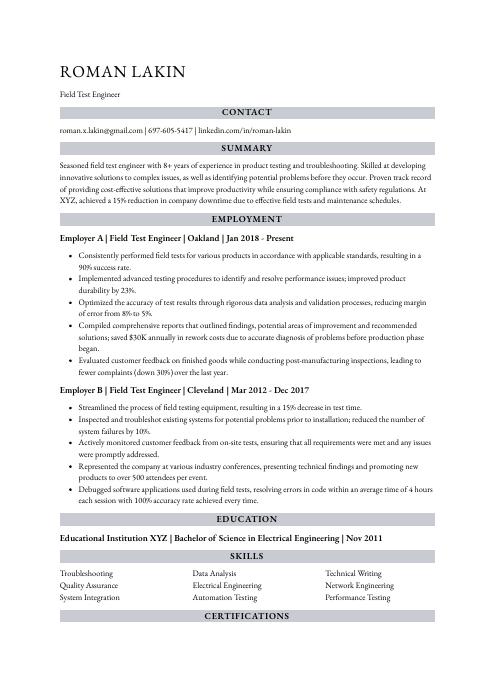 Numbat
Numbat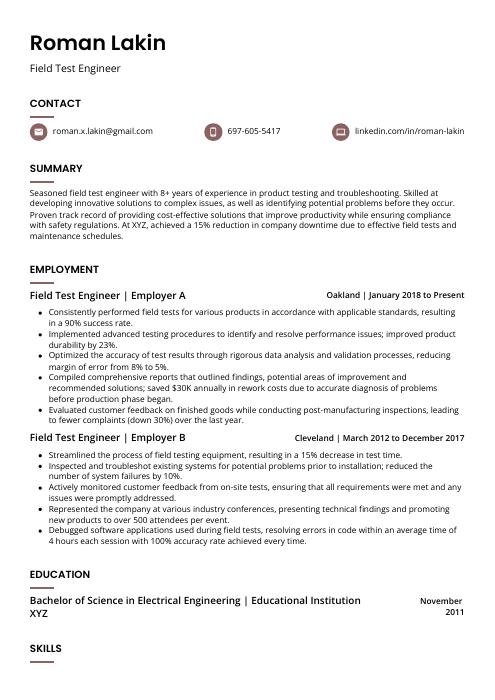 Fossa
Fossa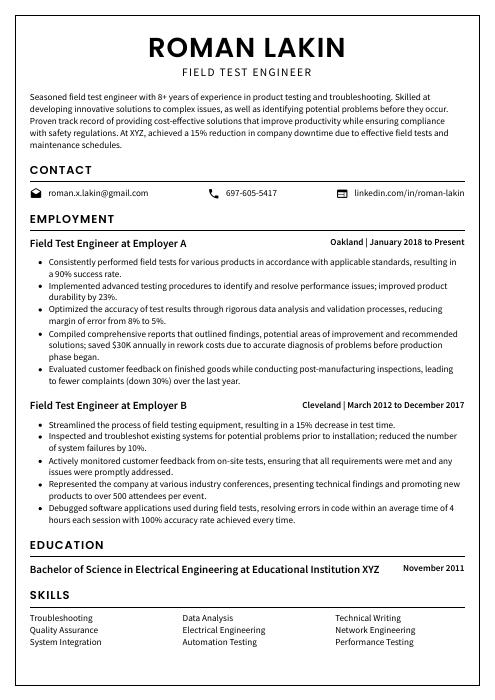 Cormorant
Cormorant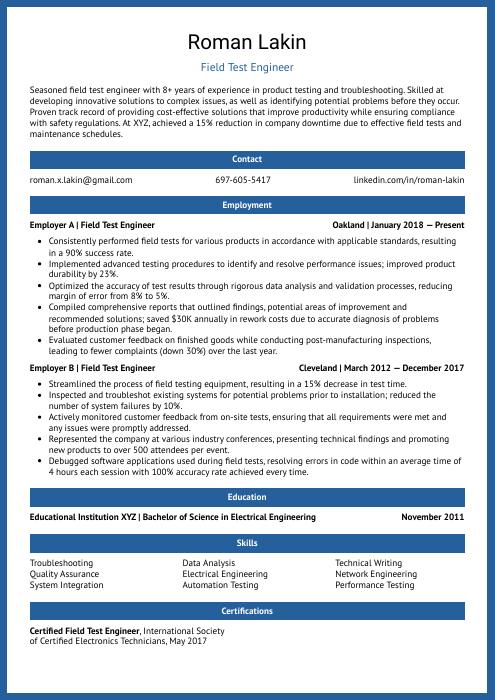 Ocelot
Ocelot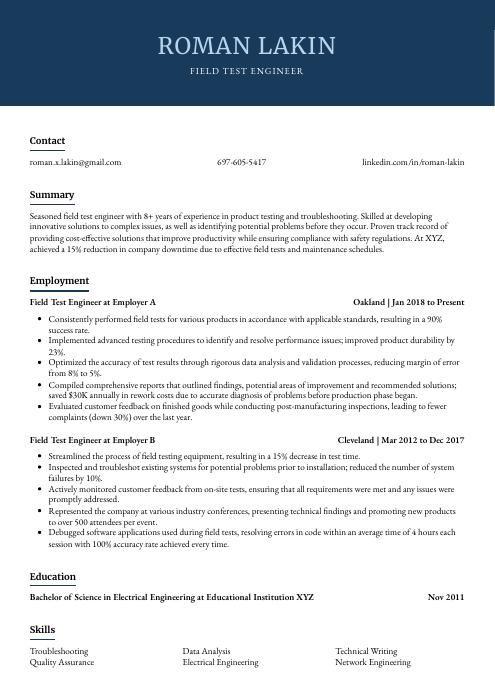 Bonobo
Bonobo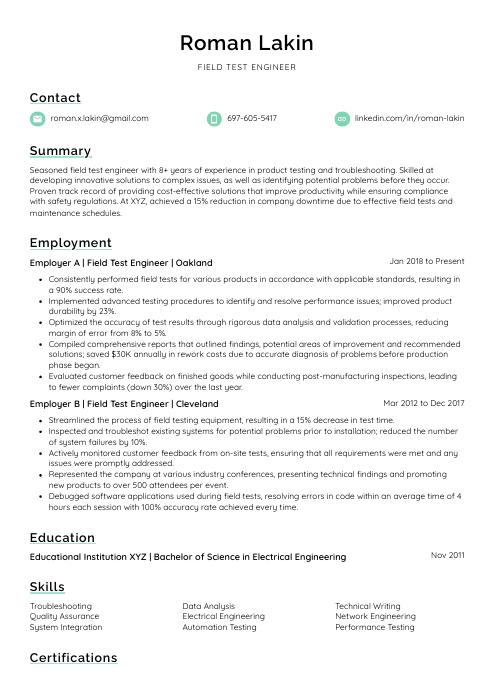 Lorikeet
Lorikeet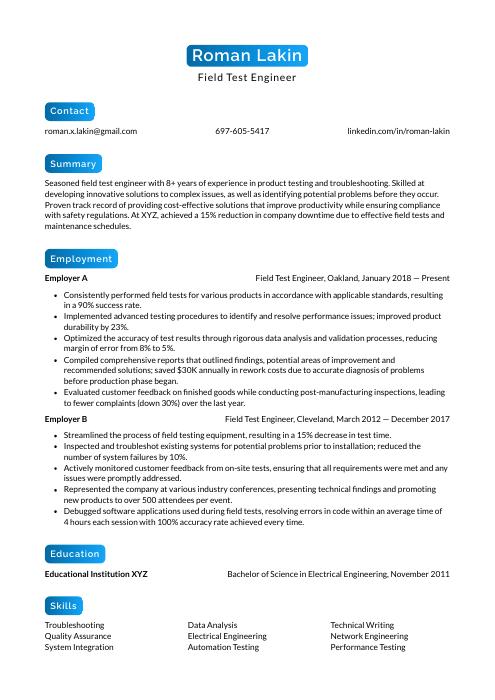 Kinkajou
Kinkajou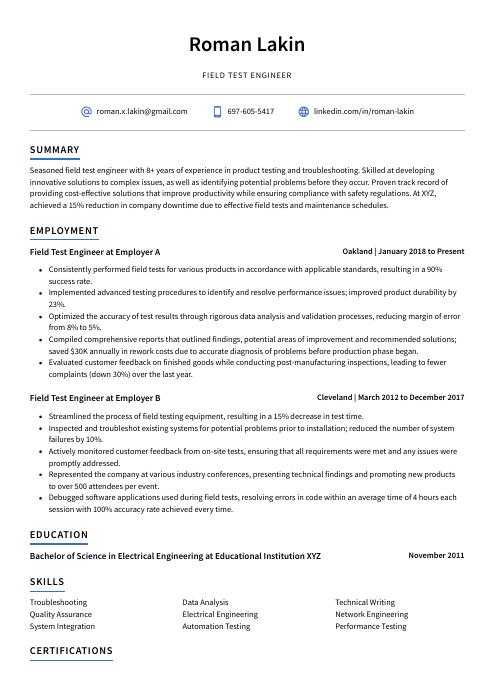 Axolotl
Axolotl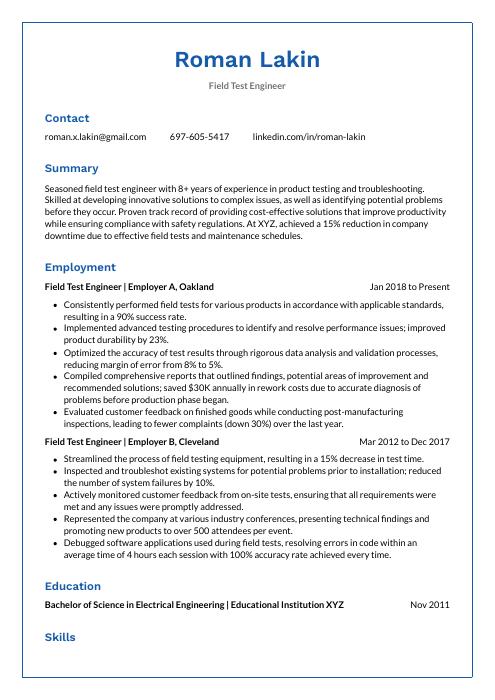 Markhor
Markhor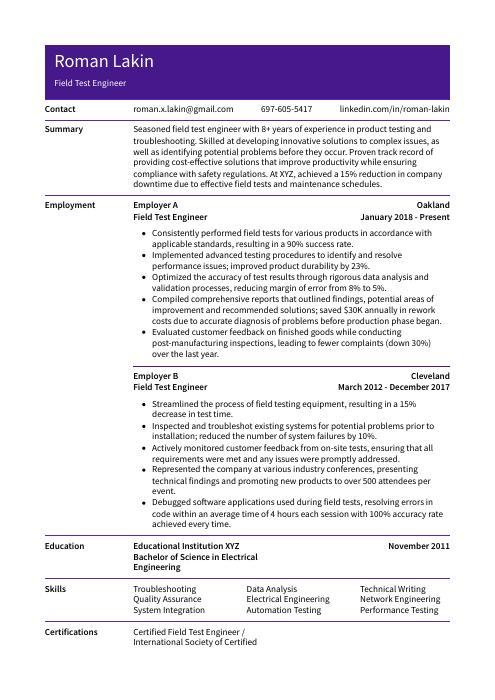 Pika
Pika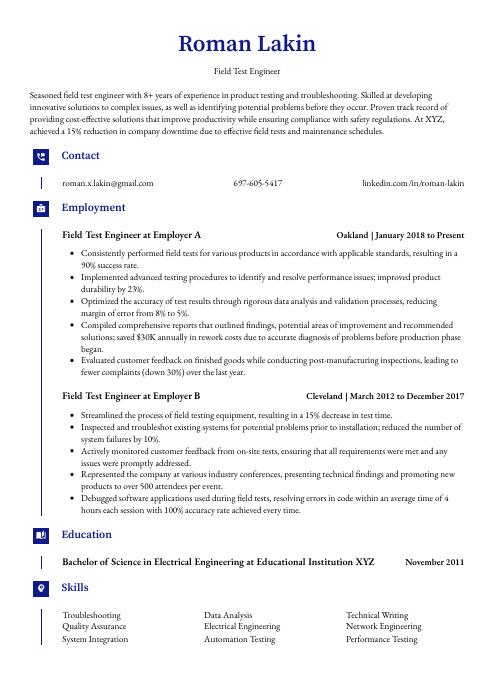 Gharial
Gharial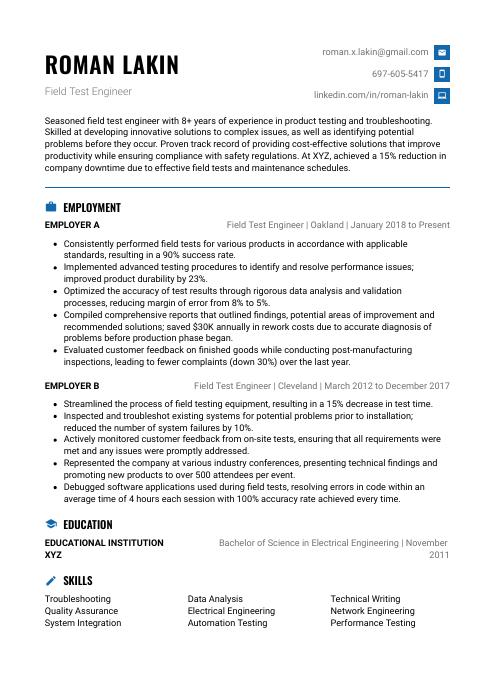 Echidna
Echidna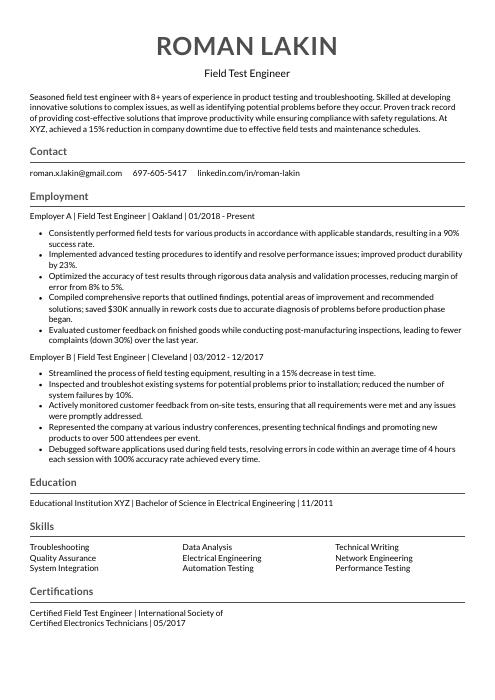 Indri
Indri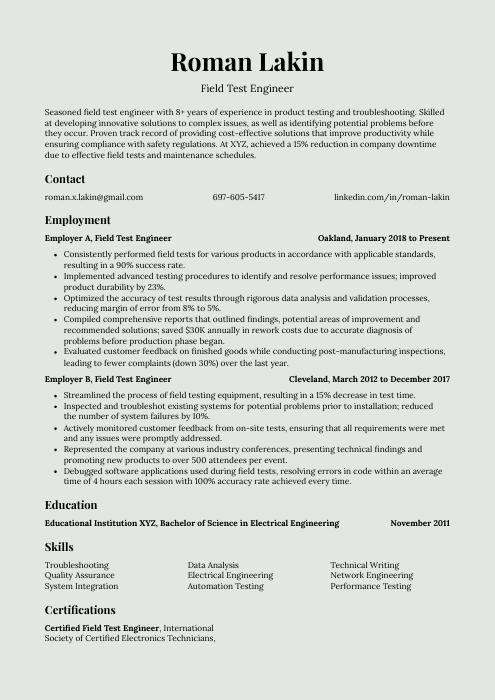 Saola
Saola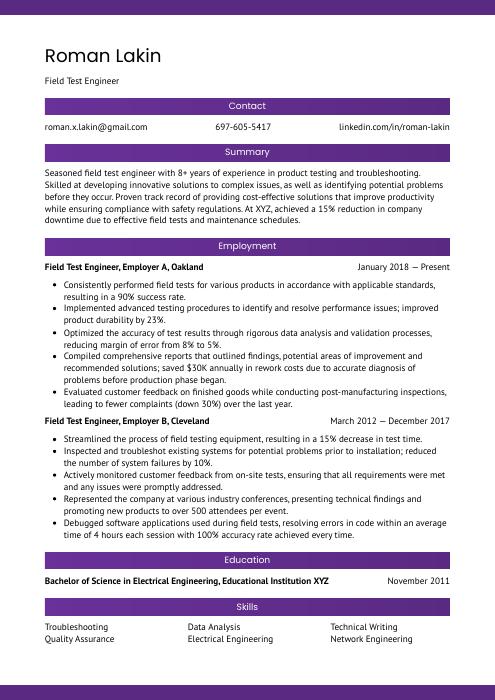 Jerboa
Jerboa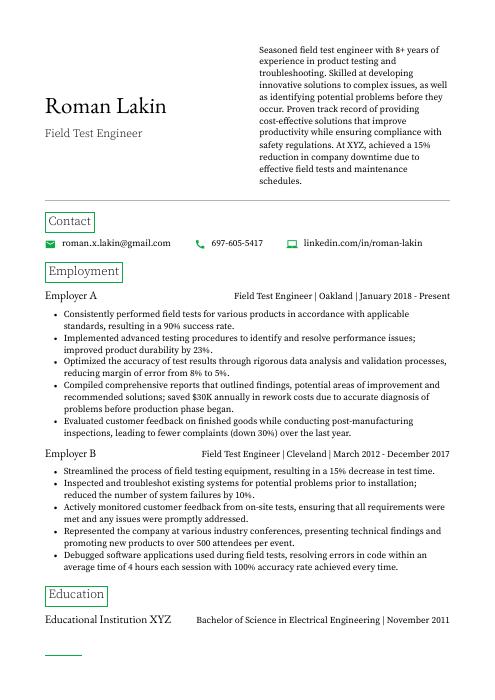 Quokka
Quokka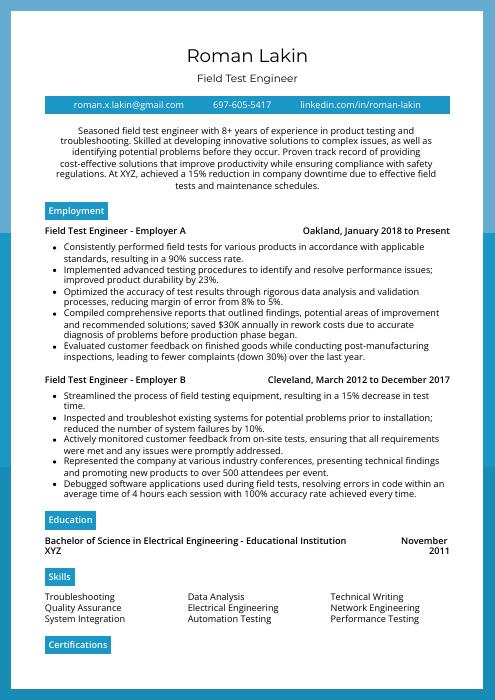 Rhea
Rhea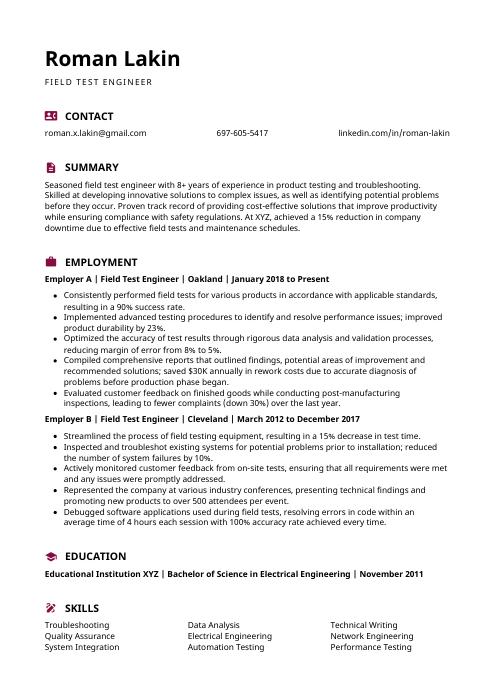 Hoopoe
Hoopoe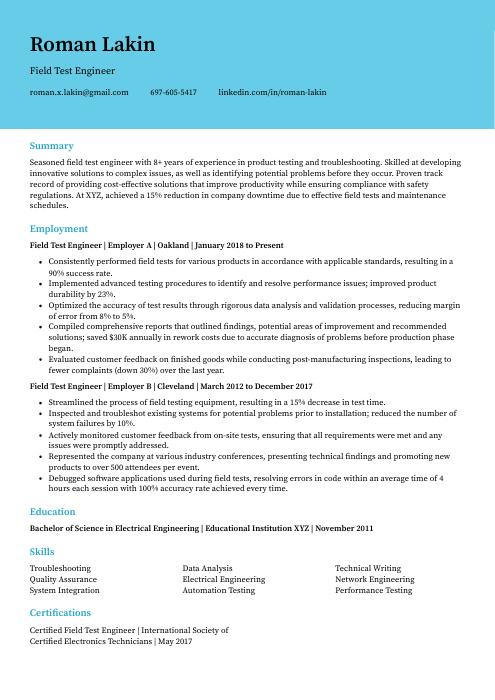 Dugong
Dugong Rezjumei
Rezjumei
